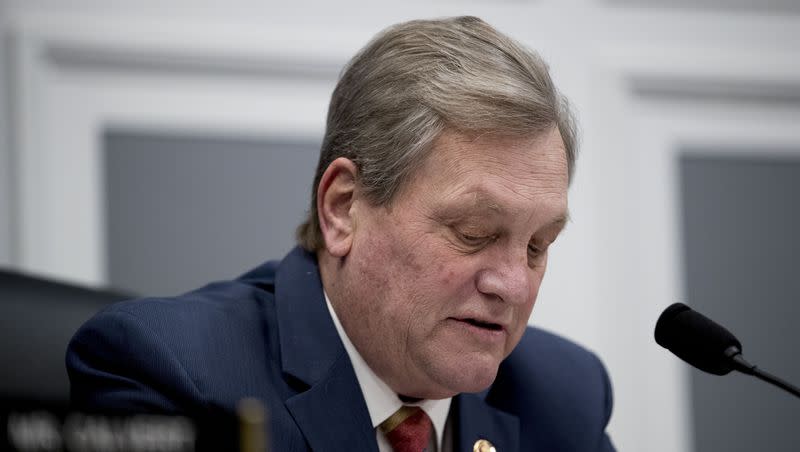With government shutdown in sight, senior lawmaker tells House Republicans: ‘Don’t get cute’

- Oops!Something went wrong.Please try again later.
One of Congress’ most experienced lawmakers has a message for House Republicans: learn your lesson.
Rep. Mike Simpson, a 12-term Idaho Republican and senior member of the House committee over spending bills, told the Deseret News on Wednesday his party cannot afford a repeat of September’s near miss with a government shutdown which resulted in the removal of House Speaker Kevin McCarthy and almost a month of wasted time.
In divided government, Simpson said, House Republicans must play their hand carefully to push back next Friday’s funding deadline while retaining their leverage to avoid getting forced into a corner by the Democratic-led Senate.
“We’re always worried about getting jammed by the Senate,” Simpson said. “But I think we’ve learned a lesson on how to deal with that. So, I’m more optimistic about the appropriations process and getting us back to what I call regular order.”
Why are House Republicans demanding a return to regular order?
Regular order — the way congressional spending existed when Simpson entered Congress in the ’90s — requires spending bills to be open to amendment and considered individually instead of being combined into a massive, 11th-hour omnibus bill by party leadership behind closed doors.
Speaking of regular order Simpson said, “That’s the way the process is supposed to work. And that’s what we’re trying to get back to.”
This term has seen House Republicans bring the annual spending process closer to what Simpson says “all the Republican members” and “every appropriator,” himself included, wants, with spending bills being brought to the floor one at a time to ensure every GOP lawmaker can make their voice heard.
Related
While this has enabled conservatives to include significant spending cuts in each of the 12 appropriations bills, it has also ensured such bills are dead on arrival in the Senate and has highlighted the divisions in the House Republican Conference which holds an extremely narrow governing majority of just four seats.
After moving quickly to pass a controversial Israel aid package, which is unlikely to see the light of day in the Senate, McCarthy’s successor, Mike Johnson of Louisiana, succeeded in passing two more appropriations bills — funding the legislative branch and several federal agencies.
However, Johnson’s honeymoon period fizzled to an end this week when two spending bills he brought to the floor failed to gain sufficient Republican support and had to be rescinded for further amendments.
This unwelcome stall to Johnson’s packed legislative schedule comes as the conference continues to be divided on the issue that took out their former speaker — a stopgap funding bill, or “continuing resolution,” to stave off a government shutdown on Nov. 17.
But the debate has shifted.
Will the House pass another continuing resolution to avoid a shutdown?
According to Simpson, there is agreement among House Republicans that a continuing resolution is needed so the House can finish its spending bills, reconcile them with the Senate versions and do so before the Senate pushes an omnibus spending package and skips town, forcing House leadership’s hand with the threat of a shutdown.
“I think we’re all committed to the fact that a government shutdown is not an option, which is good because in the past, some people thought that was a political ploy that they could use,” Simpson said.
Despite this apparent consensus, House Republicans are divided over whether the continuing resolution should extend to December, January or February, whether it should use a novel “laddered” approach which would stagger funding deadlines to incentivize the passage of individual bills, or whether to tie a continuing resolution to spending cuts.
Related
House Minority Leader Hakeem Jeffries has said Democrats will only accept a “clean continuing resolution that maintains the status quo.” But Democratic opposition won’t matter if Republicans can overcome months of infighting to pass conservative priorities through annual spending legislation.
“I wouldn’t try to go in and cut spending for the next two months on a (continuing resolution),” Simpson said. “We’re cutting spending in our appropriation bills substantially. Let us get these bills done.”
While Simpson disagrees that the back and forth among Republicans is a sign of dysfunction — “It’s a sign of democracy” — he does see a need to educate conference members on the appropriations process, explaining they must take less time off and pass a budget resolution earlier in the year if they want to avoid a similar predicament in 2024.
As for the current situation, Simpson urges his colleagues to understand that the real work of fiscal restraint happens in the appropriations bills, not in a shutdown showdown over a continuing resolution.
“That’s my message to our conference. Don’t try to get too cute with a (continuing resolution),” he said. “There are some things that need to get done.”

